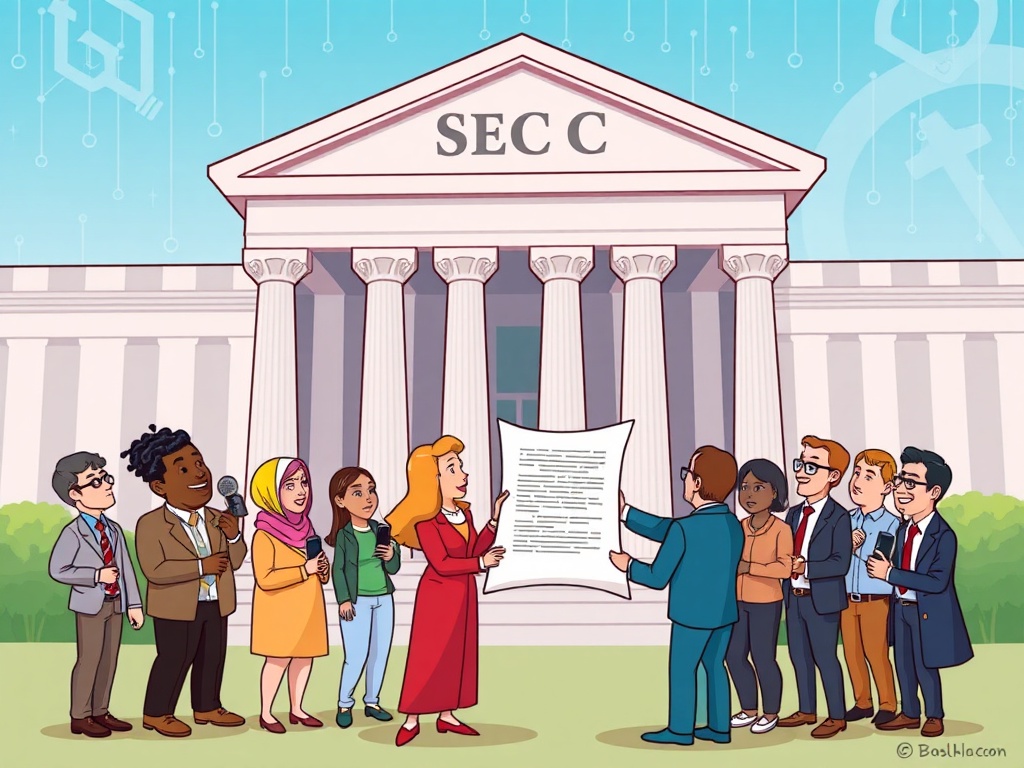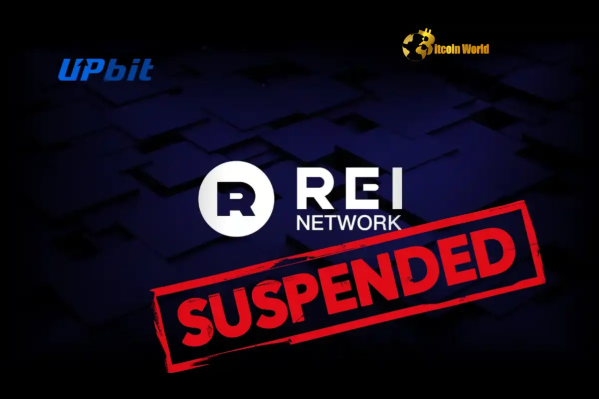BitcoinWorld

Pivotal Solana ETF Proposal: Unlocking New Investment Frontiers with LSTs
The world of cryptocurrency is always buzzing with innovation and regulatory discussions. Recently, a significant development has caught the attention of investors and enthusiasts alike: a bold proposal for a Solana ETF that incorporates a novel staking mechanism. This isn’t just another ETF application; it’s a strategic move by influential players aiming to redefine how digital assets are integrated into traditional finance.
What’s the Buzz Around the Solana ETF and LSTs?
In a move that could reshape the landscape for digital asset investments, five prominent entities – Zto Labs, Bitwise, Multicoin Capital, VanEck, and the Solana Policy Institute – have collectively approached the U.S. Securities and Exchange Commission (SEC). Their joint letter advocates for the inclusion of Liquidity Staking Tokens (LSTs) as a staking mechanism within a spot Solana ETF. This is a crucial distinction, as it seeks to leverage the yield-generating capabilities of Solana’s proof-of-stake network directly within an ETF structure.
Traditionally, staking involves locking up cryptocurrencies to support network operations and earn rewards. However, this often comes with a liquidity trade-off. LSTs, or Liquid Staking Tokens, aim to solve this by providing a liquid representation of staked assets, allowing investors to access their value even while it’s earning staking rewards. Imagine being able to participate in network security and earn yield, all while maintaining the flexibility to trade or utilize your capital. That’s the promise of LSTs.
Here’s a quick breakdown of the key players and their roles in this groundbreaking proposal:
- Zto Labs: A prominent player in the Solana ecosystem, likely contributing expertise on technical integration and network mechanics.
- Bitwise: A well-known crypto asset manager with a history of pushing for innovative investment products.
- Multicoin Capital: A venture capital firm deeply invested in the Solana ecosystem and its growth.
- VanEck: A global investment manager with a strong track record in ETFs, including those focused on digital assets.
- Solana Policy Institute: An organization dedicated to advocating for Solana’s interests and regulatory clarity.
Why Are Liquidity Staking Tokens (LSTs) So Important for a Solana ETF?
The inclusion of LSTs in a Solana ETF proposal is a game-changer. It addresses one of the primary challenges of integrating proof-of-stake assets into traditional investment vehicles: the illiquidity of staked assets. By utilizing LSTs, an ETF could potentially offer investors:
- Yield Generation: The ability to earn staking rewards directly through the ETF, enhancing overall returns.
- Enhanced Liquidity: LSTs allow the underlying staked SOL to remain liquid, meaning the ETF could theoretically manage redemptions and creations more efficiently without disrupting network operations.
- Reduced Operational Complexity: For the ETF issuer, managing staking through LSTs could simplify the process compared to direct staking operations.
- Broader Appeal: By combining the familiarity of an ETF with the benefits of staking, it could attract a wider range of institutional and retail investors who are hesitant to engage directly with on-chain staking.
This approach could set a precedent for future crypto ETFs, especially those based on proof-of-stake networks like Ethereum, potentially unlocking significant capital for decentralized finance.
What Are the Challenges and the SEC’s Stance on the Solana ETF?
While the prospect of a Solana ETF with LSTs is exciting, it’s crucial to acknowledge the hurdles. The SEC has historically been cautious about approving cryptocurrency ETFs, particularly those involving staking or spot markets, citing concerns around market manipulation, investor protection, and the nascent nature of crypto regulation.
The SEC’s primary concerns often revolve around:
- Market Surveillance: Ensuring there are robust mechanisms to detect and prevent fraud and manipulation in the underlying crypto markets.
- Valuation and Custody: Establishing reliable methods for valuing and securely holding digital assets.
- Investor Protection: Ensuring retail investors are adequately protected from the unique risks associated with cryptocurrencies.
The letter from the five stakeholders likely aims to address these concerns head-on, providing detailed arguments on how LSTs can mitigate risks and enhance the overall integrity of a Solana ETF. They would need to demonstrate that the LST market is sufficiently liquid, transparent, and resilient to support an ETF structure.
The SEC’s decision on a spot Solana ETF, especially one incorporating LSTs, will be a bellwether for the future of crypto ETFs beyond Bitcoin and Ethereum. It will signal the regulator’s evolving understanding and acceptance of more complex crypto financial products.
What Does a Solana ETF Mean for the Future of Crypto Investments?
The approval of a Solana ETF, particularly one that leverages LSTs, would have profound implications:
- Mainstream Adoption: It would provide a regulated, accessible pathway for traditional investors to gain exposure to Solana, potentially driving significant institutional capital into the ecosystem.
- Innovation in ETFs: It could open the floodgates for other innovative crypto ETF structures, encouraging asset managers to explore products based on other proof-of-stake cryptocurrencies.
- Increased Liquidity for Solana: While the ETF itself would provide liquidity to investors, the underlying demand for SOL to back the ETF could further enhance Solana’s market liquidity.
- Regulatory Clarity: An SEC approval would provide a degree of regulatory clarity for staking mechanisms within financial products, potentially influencing future legislation.
This proposal isn’t just about Solana; it’s about pushing the boundaries of what’s possible in crypto finance. It represents a significant step towards bridging the gap between decentralized innovation and traditional investment frameworks.
Expert Insights and What to Watch For
Market analysts are closely watching this development. Many believe that the SEC’s cautious approach is slowly giving way to a more pragmatic stance, especially after the approval of spot Bitcoin ETFs. The legal victories for Grayscale against the SEC have also put pressure on the regulator to be more consistent in its decisions.
Investors should keep an eye on several factors:
- SEC’s Response Timeline: Regulatory processes can be lengthy, and the SEC will likely seek public comments and conduct thorough reviews.
- Technical Details of the Proposal: The specifics of how the LSTs will be managed, custodied, and valued within the ETF structure will be critical.
- Market Conditions: The broader cryptocurrency market sentiment and Solana’s performance will also play a role in the SEC’s considerations.
The convergence of traditional finance and cutting-edge blockchain technology, exemplified by this Solana ETF proposal, is a testament to the maturation of the crypto industry. It signifies a future where the benefits of decentralized networks are accessible to a much wider audience through regulated investment products.
Conclusion: A New Horizon for the Solana ETF
The joint letter from Zto Labs, Bitwise, Multicoin Capital, VanEck, and the Solana Policy Institute to the SEC marks a pivotal moment in the quest for broader crypto adoption. Their request to permit Liquidity Staking Tokens (LSTs) as a staking mechanism for a spot Solana ETF is an ambitious and forward-thinking proposition. While the path to approval may be challenging, the potential benefits – from enhanced yield generation and liquidity to mainstream accessibility – are immense. This initiative not only highlights the growing sophistication of the crypto market but also underscores the persistent efforts of key stakeholders to integrate decentralized finance into the global financial system. The outcome of this proposal will undoubtedly shape the future trajectory of crypto ETFs and investment opportunities for years to come.
Frequently Asked Questions (FAQs)
Q1: What is a Solana ETF?
A1: A Solana ETF (Exchange-Traded Fund) is an investment fund that would hold Solana (SOL) tokens directly, allowing investors to gain exposure to Solana’s price movements without directly owning the cryptocurrency. It trades on traditional stock exchanges.
Q2: What are Liquidity Staking Tokens (LSTs)?
A2: LSTs are tokens that represent staked cryptocurrency assets. When you stake your SOL, you typically lock it up. LSTs allow you to receive a tradable token in return, which represents your staked SOL plus any accrued rewards, thus maintaining liquidity while earning staking yield.
Q3: Why are stakeholders lobbying the SEC for LSTs in a Solana ETF?
A3: Stakeholders believe that including LSTs can make a Solana ETF more attractive by allowing it to capture staking yield, which is a core benefit of holding proof-of-stake cryptocurrencies. This could enhance investor returns and make the ETF more competitive, while also addressing liquidity concerns associated with traditional staking.
Q4: What are the SEC’s main concerns regarding crypto ETFs?
A4: The SEC’s primary concerns often revolve around market manipulation, investor protection, valuation, custody, and the overall maturity and regulation of the underlying crypto markets. They want to ensure that any approved ETF is safe and transparent for investors.
Q5: How would a Solana ETF with LSTs benefit investors?
A5: Such an ETF could offer investors exposure to Solana’s price appreciation, potential staking yield through LSTs, and the convenience of trading on a traditional exchange. It would simplify access to the Solana ecosystem for those who prefer regulated investment products over direct crypto ownership and on-chain staking.
Q6: What is the timeline for the SEC’s decision on the Solana ETF?
A6: The SEC’s review process for ETF applications can be lengthy, often involving multiple rounds of feedback and public comment periods. There is no fixed timeline, but decisions typically take several months, sometimes extending to a year or more, depending on the complexity and regulatory novelty of the proposal.
Did you find this article insightful? Share it with your network to spread awareness about the groundbreaking Solana ETF proposal and its potential impact on the future of crypto investments!
To learn more about the latest crypto market trends, explore our article on key developments shaping Solana institutional adoption.
This post Pivotal Solana ETF Proposal: Unlocking New Investment Frontiers with LSTs first appeared on BitcoinWorld and is written by Editorial Team





